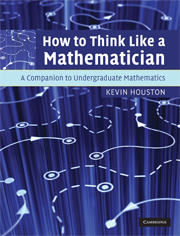Book contents
- Frontmatter
- Contents
- Preface
- I Study skills for mathematicians
- II How to think logically
- III Definitions, theorems and proofs
- 14 Definitions, theorems and proofs
- 15 How to read a definition
- 16 How to read a theorem
- 17 Proof
- 18 How to read a proof
- 19 A study of Pythagoras' Theorem
- IV Techniques of proof
- V Mathematics that all good mathematicians need
- VI Closing remarks
- Appendices
- Index
17 - Proof
from III - Definitions, theorems and proofs
- Frontmatter
- Contents
- Preface
- I Study skills for mathematicians
- II How to think logically
- III Definitions, theorems and proofs
- 14 Definitions, theorems and proofs
- 15 How to read a definition
- 16 How to read a theorem
- 17 Proof
- 18 How to read a proof
- 19 A study of Pythagoras' Theorem
- IV Techniques of proof
- V Mathematics that all good mathematicians need
- VI Closing remarks
- Appendices
- Index
Summary
Do not confuse reasons which sound good with good, sound reasons.
Anon.Mathematics is fantastic. It is a subject where we do not have to take anyone's word or opinion. The truth is not determined by a higher authority who says ‘because I say so’, or because they saw it in a dream, the pixies at the bottom of their garden told them, or it came from some ancient mystical tradition. The truth is determined and justified with a mathematical proof.
What is a proof?
A proof is an explanation of why a statement is true. More properly it is a convincing explanation of why the statement is true. By convincing I mean that it is convincing to a mathematician. (What that means is an important philosophical point which I am not going to get into; my interest is more in practical matters.)
Statements are usually proved by starting with some obvious statements, and proceeding by using small logical steps and applying definitions, axioms and previously established statements until the required statement results.
The mathematician's concept of proof is different to everyday usage. In everyday usage or in court for instance, proof is evidence that something is likely to be true. Mathematicians require more than this. We like to be 100% confident that a statement has been proved. We do not like to be ‘almost certain’.
- Type
- Chapter
- Information
- How to Think Like a MathematicianA Companion to Undergraduate Mathematics, pp. 116 - 118Publisher: Cambridge University PressPrint publication year: 2009



